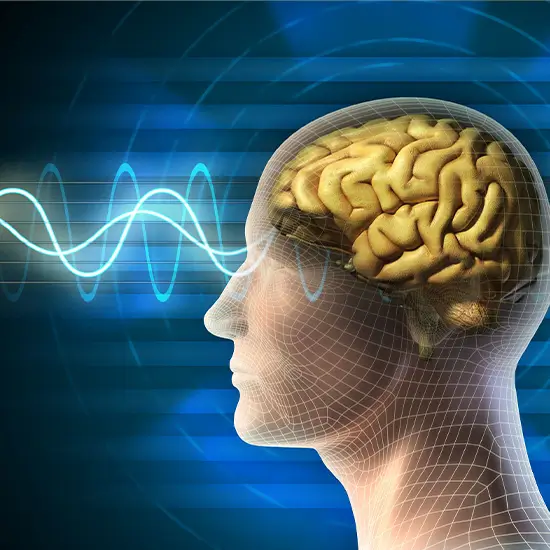
Book EEG For 30 Minutes Appointment Online Near me at the best price in Delhi/NCR from Ganesh Diagnostic. NABL & NABH Accredited Diagnostic centre and Pathology lab in Delhi offering a wide range of Radiology & Pathology tests. Get Free Ambulance & Free Home Sample collection. 24X7 Hour Open. Call Now at 011-47-444-444 to Book your EEG For 30 Minutes at 20% Discount.
An EEG (electroencephalogram) for 30mins is a procedure to monitor the activities of the brain digitally for 30mins. For the test procedure, electrodes are applied to your scalp using gel for recording the electrical activities of the brain.
EEG is used to detect abnormalities in the waves of the brain. It helps in identifying brain-related diseases including head trauma, brain infection, bleeding in the brain, damage in the brain tissues, brain tumors, injury-related brain damage, stroke, epilepsy, etc.
The step-by-step procedure for EEG for 30 Minutes.
Don’t let the abnormal activities of the brain disrupt your normal life. For early detection of brain-related disorders, Book your EEG for 30mins with Ganesh Diagnostic and Imaging Centre ( GDIC).
The cost of an EEG with 30mins. Ranges from INR 2,000 to INR 3,000.
| Test Type | EEG For 30 Minutes |
| Includes | EEG for 30 Minutes (EEG Test) |
| Preparation | |
| Reporting | Within 24 hours* |
| Test Price |
₹ 2400
|

The full form of EEG is Electroencephalogram or Electroencephalography. This testing methodology records the electrical activity of the brain. It is used to diagnose various types of brain related issues such as brain tumours, brain damage, brain dysfunction, sleep disorder, stroke, inflammation of brain etc.
The EEG test lasts for 30minutes to 60 minutes. In the case of EEG sleep study as well as prolonged EEG monitoring it may take more time for monitoring the brain health related issues.
A Normal result of EEG test shows the normal pattern of electrical activities of the brain. If the waves such as regular alpha, beta, theta, and delta are present with an appropriate brain wave frequencies and amplitudes, then it considered normal. The normal result means the brain is functioning normally within the normal pattern and there is no problem existing in the brain.
The price of EEG at Ganesh Diagnostic is INR 2200. We offer Sleep Drive EEG also at the cost of INR 2500.
No, EEG is not a painful procedure. This painless procedure measures the electrical activity of your brain. During an EEG, the technician will place the electrodes on your scalp to record the brain's electrical signals. You may experience slightly cold or sticky when they are applied, but they do not cause any pain.
EEG(Electroencephalogram) is used to diagnose and monitor various neurological conditions. It has several benefits such as:
You will not feel any pain, discomfort, or electrical sensation during the procedure. The procedure of EEG involves the use of electrodes that are placed on your scalp to record the electrical activities of your brain activities. During the procedure of EEG, you may be asked to under certain stimuli such as deep breathing, flashing lights, or hyperventilation to provoke the activities of the brain. These activities may induce specific sensations on a temporary basis.
EEG test is used to diagnose:
The abnormal EEG indicates the neurological disorders. If EEG is abnormal, then your doctor may recommend you to neurologist for management and treatment of brain related abnormalities such as confusion, epilepsy, cognitive impairment, sleep disorders etc.
No, EEG doesn’t show anxiety. It is used to measure the brain’s electrical activities and is not particularly designed to diagnose anxiety. The EEG recording reflects the changes in the patterns of the brain waves associated with various mental states including anxiety.
EEG alone cannot directly locate the site of brain damage. It provides valuable information about the function of the brain and can indirectly show the presence of brain damage. It detects abnormalities in the electrical activity of the brain that may suggest underlying brain dysfunction or injury. For a comprehensive evaluation of brain damage, other imaging techniques are used in conjunction with EEG.
No, EEG is not a primary diagnostic tool for detecting brain tumors. To identify a brain tumor, usually Imaging techniques like CT scans or MRI are used as the first-line diagnostic methods. Because these imaging tests can provide detailed images of the brain's structures and help visualize the presence, location, and characteristics of a brain tumor.
No, you cannot sleep during the EEG test. Generally during the EEG test, the patient remains awake and relaxed. But in the case of specific EEGs such as Sleep- deprived or sleep study, the patient is allowed to sleep during the testing procedure to observe the brain activities during different sleep stages.
The procedure of EEG is safe and there are typically no side effects. But some patients may experience redness and irritation at the site of the electrode because of adhesives used to attach the electrodes to the scalp.
The choice of CT scan and EEG depends on the suspected condition and the purpose of diagnosis. In the case of structure abnormalities, a CT scan is preferred. On the other hand, for the brain’s functions and electrical activities of the brain, EEG is preferred. So, we can say that the use of specific imaging techniques depends on the medical condition.
Early check ups are always better than delayed ones. Safety, precaution & care is depicted from the several health checkups. Here, we present simple & comprehensive health packages for any kind of testing to ensure the early prescribed treatment to safeguard your health.